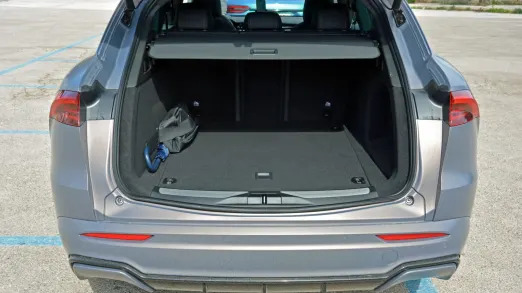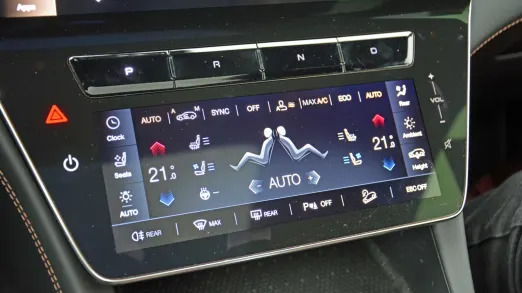2025 Maserati Grecale Folgore First Drive: Roughly translated 'electric Maserati SUV'

LECCE, Italy – Maserati believes its customers should decide if and when they go electric. While it’s building up its range of EVs for motorists who think a twin-turbocharged V6 engine is the automotive equivalent of the horseshoe crab – the next-generation Quattroporte and Levante will notably be electric – it’s still developing and selling gasoline-burning cars for those who are less than enthralled by battery technology.
It launched the Grecale, its smallest SUV and its most affordable model by a significant margin, in 2022 and initially made it available with either a four- or a six-cylinder engine. It’s a bet that paid off: Aimed at the Porsche Macan, the Grecale has predictably become the Italian company’s best-selling model. The range expands later this year with the all-electric 2025 Maserati Grecale Folgore. In Italian, it’s name means “Greek Lightning,” so that’s fun.
Some carmakers, such as Mercedes-Benz, set their electric and gasoline-burning models apart by lumping the EVs into a sub-brand and giving them a powertrain-specific design. Maserati sees this approach as an avenue that’s best detoured, so the Folgore doesn’t scream, “Hi, folks, look at me: I’m electric!” It looks pretty much like the piston-powered Grecale with the exception of minor details. That’s intentional.

“In terms of the shape of the car, we don’t want to change the customer’s perception. Our customers know Maserati as a luxury brand, but we’re also known for Italian design. We don’t want to be generic; we want to be timeless. We don’t want to follow a trend. Our mission is to achieve visual longevity,” Maserati designer Andrea Bruno told me on the sidelines of the Grecale Folgore launch. “These trends move fast. One month, everyone loves it. The month later, everyone has already forgotten it. We need to do something timeless.”
Some of the visual changes made to the Folgore help improve driving range by reducing the drag coefficient. Up front, there’s a redesigned grille with a much smaller open area. Out back, Maserati added a redesigned air diffuser. Copper-colored accents also make the Folgore stand out, and the gasoline-powered model’s three fender-mounted air intakes are filled in and fitted with LED lights.
Rame Folgore, a paint color that changes from gray-ish to brown-ish depending on the light that hits it, is EV-specific as well. It’s the color you’re seeing in our gallery, above. Other colors are also available. Finally, new wheel designs ranging from 19 to 21 inches were created for the Folgore.

The interior layout remains unchanged. The driver faces a 12.3-inch digital instrument cluster that straddles the steering column, and the center stack is dominated by a pair of touchscreens. At the top, there’s a 12.3-inch unit that displays the infotainment system, which gains a handful of electric-only menus. Below it, right under a row of clunky buttons used to select Park, Reverse, Neutral, or Drive, there’s an 8.8-inch unit that puts the climate control system’s various menus and other miscellaneous features at your fingertips. The cool, smartwatch-like clock remains positioned in the middle of the dashboard as a reminder that Maserati is constantly balancing its heritage and its future.
Copper-colored details, including the stitching and some of the trim pieces, denote the Folgore as an electric model, and the upholstery you sit on may have lived on a fishing boat in another life. Called Econyl, it’s made using recycled nylon such as old fishing nets, fabric scraps from mills, and old carpet. No, it doesn’t smell like tuna, and no, you can’t tell it was once trash; it manages to look and feel upscale.


While the Folgore rides on an evolution of the Giorgio platform borrowed from sister company Alfa Romeo, calling it a reskinned Stelvio would be cruelly inaccurate. Maserati made significant changes to the architecture to build the Grecale on it, and it then made further modifications to electrify it. The subframes are new, for example, and much of the tuning was done specifically for the Folgore.
Power for the Folgore comes from a pair of electric motors (one per axle) that draw juice from the sizable 105-kilowatt-hour lithium-ion battery pack mounted under the passenger compartment. The pack is flat rather than T-shaped like the GranTurismo Folgore’s because Maserati wanted the EV to offer exactly the same interior space as the standard Grecale – and, to its credit, it pulled this off. That’s why there’s no frunk; Maserati considered it but decided there’s plenty of space in the trunk, including a hidden storage compartment below the floor.


The drivetrain delivers permanent through-the-road all-wheel drive with variable torque distribution, and its total output checks in at about 550 horsepower and 605 pound-feet of torque. For context, the Grecale Trofeo – the most powerful gasoline-burning model, with a twin-turbocharged, 3.0-liter V6 – posts numbers of 523 and 457, respectively. On paper, the EV stands proud as the performance champion.
On the road, it’s a different story – get the Trofeo if you want flat-out performance. It hits 62 mph from a stop in 3.6 seconds, versus 4.1 seconds for the Folgore. The big difference in torque between the two variants is overshadowed by an even bigger difference in weight. Maserati says the battery weighs around 1,500 pounds; that’s like strapping a Citroën 2CV and its driver to the roof of the standard Grecale. The Folgore tips the scale at roughly 5,467 pounds compared to 4,629 pounds for the heaviest gasoline-burning trim. We’re approaching Ford F-150 Raptor R turf. This isn’t specific to Maserati: an EV weighs substantially more than a comparable gasoline-powered model.
Although the GranTurismo Folgore uses an 800-volt electrical system, the Grecale is built around a 400-volt architecture that maxes out at a charging speed of 150 kilowatts. Charging from 20% to 80% can take approximately half an hour in the right conditions, and Maserati’s estimated range using Europe’s WLTP testing cycle stands at between 264 to 311 miles depending on the configuration. EPA estimates will be lower.
“We envisioned (the Grecale Folgore) as a daily driver. It’s not super sporty (like the GranTurismo Folgore). So, we decided to use a 400-volt system that can charge at up to 150 kilowatts. We think it’s enough for this car,” said Andrea Zizak, the Grecale Folgore’s engineering vehicle line executive. In comparison, the GranTurismo Folgore is capable of taking charging speeds of up to 270 kilowatts.


You start the Folgore by pressing the blue “start engine” button on the steering wheel (despite not having an engine), and you put it in Drive by pushing the “D” button on the center stack. You’d follow exactly the same sequence in a V6-powered model. The differences end there, however. Instead of a sonorous six-cylinder you get silence, which is quickly broken by an artificial, engine-like sound that permeates the cabin via speakers. Onlookers can hear it, too, as it’s also piped through external speakers, including two located under the rear bumper. Creating noise for EVs when in motion is a law for obvious safety reasons, but Zizak jokes that “people need to hear you coming when you arrive in a Maserati.”
Like most EVs, especially in this segment of the market, the Folgore delivers smooth, linear, and quick acceleration. An interesting side-effect of selling gasoline- and battery-powered versions of the same model is that the powertrain differences immediately jump out at you. Compared to even the base four-cylinder variant of the Grecale, the Folgore feels less raucous and much more laid-back – whether that’s a good or a bad thing depends largely on your view of Maserati’s image and the attributes that you’re looking for in a luxury SUV.
Maserati kept the gasoline-powered Grecale’s steering and air suspension hardware but retuned it all to take the added weight and the different weight distribution into account, so in many ways the Folgore delivers familiar handling. It’s comfortable, even over rough roads, but it’s pegged on the sporty side of the comfort scale. If it were softer, it wouldn’t feel like a Maserati – the firm is known for luxury but performance has always been a part of its DNA. If it were more hardcore, it would likely be too harsh for its target audience; this is a sporty family car, not a jacked-up MC20 built to obliterate lap records. It’s markedly more bottom-heavy than the other Grecale variants, so it’s not as light on its feet on a fast-paced twisty road, and the steering is pleasantly direct but it doesn’t provide a great deal of feedback.

Zizak told me one of the puzzles Maserati’s engineering team needed to solve as they electrified the Grecale was cabin noise. Without an engine humming, a chorus of small noises tends to pipe up. Adding sound-deadening material kept many of these sounds quiet, but wind noise – especially at highway speeds – remains more perceptible in the Folgore than in, say, the Trofeo. It’s not bad, but it’s there.
There are four drive modes called GT, Sport, Off-Road and Max Range. GT is the standard mode; it’s the one you start off in after the Folgore powers on. Sport sharpens the throttle response, stiffens the suspension, and cranks up the artificial engine sound, while Off-Road dials in additional ground clearance to ensure rocks and other obstacles don’t turn the underbody into a punching bag off-pavement. Max Range is for those “oh, yikes, we’re going to run out of range” moments. It’s best used when the battery’s charge falls below 16%, according to Maserati, because it noticeably reigns in the throttle response and limits the climate control system’s output. It also caps the top speed at 80 mph, though that’s less of an inconvenience than a lazy accelerator pedal and half-hearted air conditioning.
From the driver’s seat, the materials used throughout the cabin feel suitably upmarket to live up to the Maserati name. The brand is taking build quality seriously, and the Grecale is a genuinely nice place to travel in. The technology is reasonably easy to use. Even the dual-screen setup isn’t as daunting as it might initially look. Everything is there when you need it, but it’s not in your face when you don’t. Every version of the Grecale still feels like a car rather than a big metal smartphone with wheels and seats. The one exception is the volume slider, which is inconveniently located on the right side of the bottom touchscreen, where it’s much closer to the front passenger than to the driver.


The steering column-mounted shift paddles come from the gasoline-powered Grecale as well, but in the Folgore they serve a very different purpose: they’re linked to the brake energy recuperation system. Dialing in the lowest amount of regen allows you to coast when you lift your foot off of the accelerator, and dialing in the highest amount of regen makes one-pedal driving possible. Maserati also programmed several levels in between, including a middle ground that feels a little like an engine brake in a piston-powered car. I like this approach to regen: Provide different options and let the driver (someone who might be a first-time EV owner) try them all before deciding what works best for them.
It’s this line of thinking that best sums up the Folgore. Put simply, it’s an electric Grecale.
As a buyer, the most important choice you need to make is whether you want an electric car. Everything else carries over. Regardless of which powertrain you choose, you’re not getting more or less technology, you’re not getting more or less interior space, and you’re not getting a drastically different design. Even in terms of performance, the Folgore and the Trofeo more or less land in the same ballpark.
Due out as a 2025 model, the Folgore will be built in the same factory near Rome as the other Grecale variants. Pricing information hasn’t been released yet, but Maserati announced that every purchase will include a wall-mounted charger and its Public Charge app.



